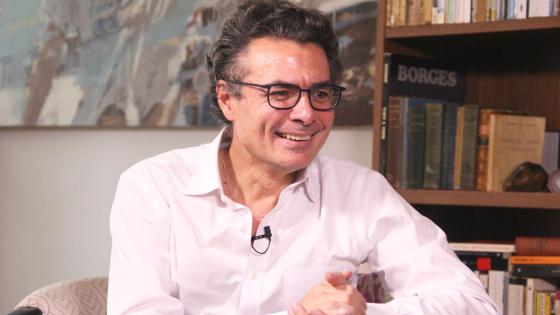The previous words arose after a compulsive reading of Fernando Vallejo: Logoi (1984). Why compulsive? Because it is from a work that I understand has been discontinued for the market and with few copies available in public libraries. Logoi is a research book that Fernando Vallejo wrote to teach himself to write, publishing from then on autobiographical novels, biographies, physics and biology treatises, film scripts and speeches (the latter specifically compiled in his Peroratas, 2013).
I discovered Vallejo at the age of 16 at school. He returned to Colombia for a few days to appear at Filbo and that was what gave me news of him. Moved by curiosity, I saw and heard on the Internet the speech he gave at the León de Greiff Auditorium in the National University to receive the Doctorate Honoris Causa “not because of his merits, which he has had none, but because of your generosity.” I understood then, without having yet laid my eyes on his books, that literature, in its smallest and largest forms, has cadence, sonority, rhythm, alliteration, consonances, pauses, euphony.
“And euphony, above meaning itself, is the great reason for literature,” says Vallejo in the introduction to his grammar of literary language and this is confirmed not only by contemporary writers, but also by earlier times, as they drank from the deep well of syntactic formulas common to all languages and free to use for authors of all literary genres.
This prologue -which for texts on web pages is a prologue- is to note that, once the interview with Alexander Gaviria, he gave me, without hesitation, the copy of Logoi that he had in his library, when I asked him to give me a reference to buy it. Copying here what he wrote in the dedication would not only be an exercise in unnecessary vanity, but a commonplace that “even becomes a literary resource” (again Vallejo). But for clichés, this prologue.
Gaviria’s face is happy when he talks about books. But not happy with euphoria, but with fullness, with intellectual ecstasy. It is, in his own words, a controlled explosion. The mere mention of names and surnames as Jorge Luis Borges, Stephan Zwaig, Pablo Neruda, Gabriel García Márquez or Joseph Conrad predispose Gaviria to a more focused dialogue, without the exhaustion of the news, avid for conversations, literature, social gatherings.
He doesn’t care if they see him as a bookworm. Although that is one of the nicest descriptions that she has received in recent years. Politics made him the target of ideologues and militants who see some as lukewarm and others as elitist. He prefers to answer that he sees himself as a democratic reformer, with a capacity for focused action, and not as a revolutionary with utopian and totalitarian airs.
And if the pressure insists on becoming unbearable, there is the vallenato, the songs of Diomedes and Jorge Oñate, “the music of the town” that his father spoke of and that will have given him more than a breather between the comings and goings of being a public official, a minister on two occasions, a rector on others and a writer on most.
He is not afraid of drawing conceptual relationships that, at first glance, would be absurd. Was Diomedes Díaz an equivalent to a metal or rock star in La Junta? Gaviria spoke about this and other things with ‘El Metalero’ in an interview that, at least for the latter, will appear as one of the happiest, with the lights in the ministries dimmed and the bulbs in the libraries shining.
